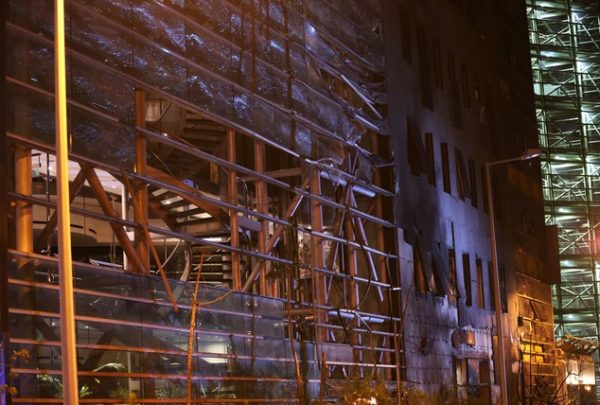
There were no immediate claims of responsibility.
The Lebanese banking sector has been at the center of an escalating crisis since the United States passed a law targeting the finances of Hezbollah. The powerful Shi’ite Muslim group has launched verbal attacks on the central bank over the implementation of the act in Lebanon.
Blom Bank is one of the banks that has closed accounts belonging to people suspected of links to Hezbollah.
There was not immediate comment from Hezbollah on the bomb blast.
The Lebanese Red Cross said two people suffered minor injuries in the blast, which took place outside Blom Bank headquarters in the Verdun area of Beirut, the National News Agency reported.
Smoke rose from the area. Local television showed footage of a damaged building, with one hole in a concrete wall, and said shattered glass had fallen to the ground from several storeys up.
A security source said the bomb had contained 2 kg (4 lb) of explosives. Interior Minister Nohad Machnouk said the device had been left in a bag by the back wall of the building.
“Politically it is clear that target was Blom Bank only,” he said, adding that the attack had nothing to do with the militant group Islamic State, which has mounted suicide bombings in Beirut. Machnouk said initial reports indicated there had been no fatalities.
The last bomb attack to hit the Lebanese capital killed more than 40 people in the southern suburbs, an area where Hezbollah is dominant. That bombing was claimed by the Sunni Muslim Islamic State.
TARGETING HEZBOLLAH’S FINANCES
Heavily-armed, Iran-backed Hezbollah, which is classified as a terrorist group by the United States, wields enormous political influence in Lebanon and its powerful military wing is playing a major role in backing President Bashar al-Assad in the Syrian conflict.
The U.S. act passed in December, the Hezbollah International Financing Prevention Act (HIFPA) threatens to punish any organization providing significant finance to Hezbollah.
It has ignited an unprecedented dispute between Hezbollah and a central bank widely seen as a pillar of the otherwise weak and dysfunctional Lebanese state.
The central bank has said the U.S. law must be applied to avoid the international isolation of Lebanon’s banking sector.
Hezbollah has strongly criticized the bank for agreeing to measures it deems as part of a war against it.
The group’s parliamentary bloc issued a statement last week reiterating its criticism of the central bank’s position, saying the U.S. law infringed Lebanon’s national sovereignty.
Central bank governor Riad Salameh last month said banks must comply with the law, but sought to ease concerns, assuring Lebanese citizens the regulations protect them from having bank accounts arbitrarily blocked or closed.
Since 2001, the United States has put more than 100 individuals and entities affiliated with Hezbollah onto sanctions lists under existing anti-terrorism funding legislation, but the new law is aimed at Hezbollah specifically.
Hezbollah, whose fighters played a major role in forcing Israel to withdraw from southern Lebanon in 2000, enjoys strong support in the Lebanese Shi’ite community. Its members include government ministers, lawmakers and local councillors.
REUTERS

Leave a Reply
You must be logged in to post a comment.